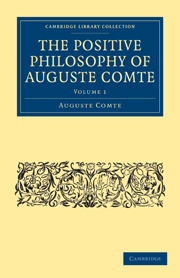CHAPTER IV - RATIONAL MECHANICS
Published online by Cambridge University Press: 29 August 2010
Summary
Its nature
Mechanical phenomena are by their nature more particular, more complicated, and more concrete than geometrical phenomena. Therefore they come after geometry in our survey; and therefore must they be pronounced to be more difficult to study, and, as yet, more imperfect. Geometrical questions are always completely independent of Mechanics, while mechanical questions are closely involved with geometrical considerations,—the form of bodies necessarily influencing the phenomena of motion and equilibrium. The simplest change in the form of a body may enhance immeasurably the difficulties of the mechanical problem relating to it, as we see in the question of the mutual gravitation of two bodies, as a result of that of all their molecules ; a question which can be completely resolved only by supposing the bodies to be spherical; and thus, the chief difficulty arises out of the geometrical part of the circumstances.
Our tendency to look for the essences of things, instead of studying concrete facts, enters disastrously into the study of Mechanics. We found something of it in geometry; but it appears in an aggravated form in Mechanics, from the greater complexity of the science. We encounter a perpetual confusion between the abstract and the concrete points of view; between the logical and the physical; between the artificial conceptions necessary to help us to general laws of equilibrium and motion, and the natural facts furnished by observation, which must form the basis of the science.
- Type
- Chapter
- Information
- The Positive Philosophy of Auguste Comte , pp. 106 - 136Publisher: Cambridge University PressPrint publication year: 2009First published in: 1853



